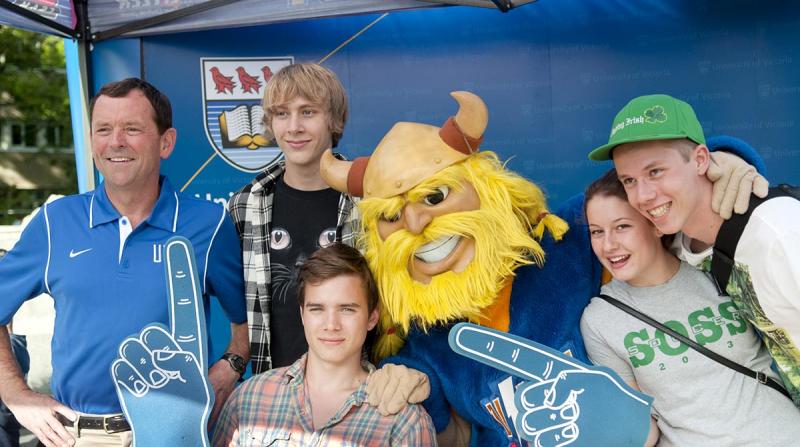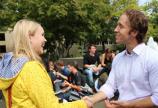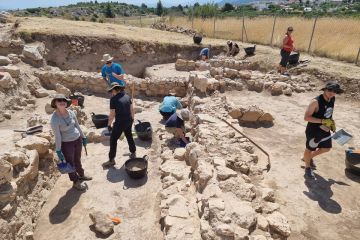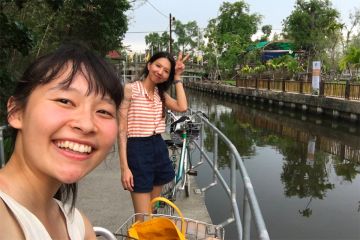Engagement: the key to a full student experience
Peter B. Gustavson School of Business
- Kim Westad

It can take Anas Cheema an hour to walk across campus – the 22-year-old economics student seems to know every second person and has a friendly greeting for them all.
It wasn’t always this way for Cheema, who came to UVic in 2011, not knowing anyone. The international student from Pakistan spent his first few months on campus feeling lonely, isolated and stressed.
“I was so excited to come to UVic because of the beauty of its natural setting and the smaller class sizes and the friendly sort of energy, but it was still very daunting when I got here,” Cheema said. “After a while, I looked around and thought, ‘What can I do?’”
Making the connection
Cheema remembered how welcoming the international student association had been to him in Malaysia, where he went to university the year before. So he started the first international student club at UVic. With more than 1,600 international students from 100 different countries at UVic, the club grew quickly and now has 800 members.
That sense of reaching out engaging with others led to Cheema looking for more opportunities on campus and off for different experiences. All of it has enriched his experience at UVic, he said. What Cheema has done is often called “student engagement”, a phrase with growing importance on campuses worldwide. Studies and anecdotal evidence show that students who do more than hit the books during their post-secondary years tend to have a better experience on campus, and out in the world when they finish. For many students, it is defined simply as “get involved.”
UVic President Jamie Cassels knows and supports the importance of those words.
“By choosing UVic, you have the opportunity to learn from internationally respected professors and to work and learn side by side with students from across Canada and around the world,” Cassels said.
“I encourage you to get involved– in the classroom and beyond. You are surrounded by faculty and staff members who want you to succeed and who are there to provide support and encouragement. But at the end of the day, the quality of your UVic experience will also be a result of your own efforts. Make the most of this life-changing opportunity by working hard and taking part – and have some fun along the way.”
Cheema, for example, has taken that sense of involvement out to the community in a big way: he recently finished cycling across Canada to raise money for the SOS Children’s Villages, a charity that helps abandoned and orphaned children in 133 countries. He raised more than $5,000 for the charity, made friends across Canada and learned a lot about himself – especially after his bike and all his belongings were stolen from a Winnipeg McDonald’s late one night.
“I was so upset at first, but I had determination and I knew I wasn’t going to give up,” Cheema said. Eight separate people and several businesses offered up their own bikes for Cheema – and he finished his journey on a new Cannondale given by a bike shop, rolling into Halifax on Aug. 14, accomplishing his goal in two months.
Sharing skills, making community
Cheema’s might seem like an extreme example of involvement – not everyone has the kind of enthusiasm needed to bike 6,000 kilometres – but the resulting sense of balance and connection with the world around you that can be achieved while getting a post-secondary education is a connection that’s also echoed by Rebecca Harvey.
Harvey went to college in her hometown of Cranbrook, and never felt the need to look beyond already established support networks of friends and family. That all changed when she transferred to UVic two years ago. Harvey started working with the peer helping program through the university’s counseling services. She and 60 other students were trained to help students deal with stressors, from academics to personal issues.
“I learned a lot of skills that are still helping me today,” said Harvey, who graduated in the spring with a BA in sociology and psychology. “I’m at school to get an education first, but my grades didn’t slip when I did this work, and I felt more connected. There was a lot of good networking, I made amazing friends and UVic started to feel more like a home rather than just a school.” Harvey found that helping others helped her too.
“I learned it’s okay to ask for help and that having a support system is a huge necessity for students. It can be a really stressful time.”
A school is more than its courses
New students face many stressors, said Kate Hollefreund, events co-ordinator with UVic student recruitment. “Students are often nervous and anxious – and they want to succeed,” Hollefreund said. “They may have seen their big brothers and sisters come out of university and not get jobs right away. That adds to their stress.”
The new student orientation held on Sept. 3 was geared to ease some of those concerns, as well as providing a sense of community for students. More than 3,300 new students attended the rousing event, listening to a keynote address by Craig Kielburger, co-founder of Free the Children and Me to We, and a welcome from President Jamie Cassels.*
Students met the deans of their faculty, toured the areas where they’ll find most of their classes, stopped by the First Peoples House and visited the Mearns Centre for Learning. The day ended with welcome barbecue at the UVic fountain featuring a photo booth with Cassels and Thunder, the mascot.
It’s meant to be fun, but with needed information available as well, Hollefreund said.
“A lot of students don’t seek out support until they need it. They might not realize from the get-go that you need to get involved, to make friends and build that support network early. If you do have those dips in the road on your path, they won’t be as deep and they’ll be easier to come out of if you have a support network in place.”
That support network can be as simple as teammates on an intramural team, or fellow volunteers at CFUV or the friends made eating in residence.
Prof. Lara Lauzon in UVic’s School of Exercise Science, Physical and Health Education has seen firsthand the challenges students face on campus, and the benefits of involvement at school and in the community. Lauzon teaches a first year class that requires students do a group community service project.
“A lot of them hate the idea of a group project,” Lauzon said. She does it on purpose to make students engage with each other in a large class – something that can be difficult to do – and then to have to work collaboratively for the good of the community.
Students help at foodbanks, do clothing drives, beach clean-ups, composting – and end up enjoying it.
“Many of them come to me later and say, “To be honest, I didn’t want to do this project.” By the end, they’re just transformed. They say it changed their life not just because of education, but because of engagement.”
_
*Article updated September 5 to reflect full count of new student orientation attendees.
Photos
In this story
Keywords: study abroad, international
People: Anas Cheema






